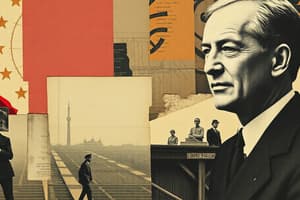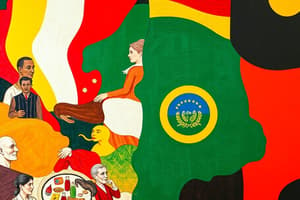Podcast
Questions and Answers
What is the primary role of the federal court in relation to the constitution?
What is the primary role of the federal court in relation to the constitution?
- To interpret the constitution (correct)
- To enforce the laws of the central legislature
- To resolve disputes between citizens
- To amend the constitution
What is the significance of bicameral legislature in a federal state?
What is the significance of bicameral legislature in a federal state?
- To increase the size of the legislature
- To provide equal representation to the competent units (correct)
- To reduce the power of the federal government
- To provide representation to the central government only
What is the main advantage of federalism in combining unity with diversity?
What is the main advantage of federalism in combining unity with diversity?
- It leads to administrative inefficiency
- It maintains a balance between centripetal and centrifugal forces (correct)
- It provides more power to the central government
- It ensures uniformity in laws and policies
What is the benefit of experimentation in federalism?
What is the benefit of experimentation in federalism?
What is the significance of the federal court's power to declare laws as ultra vires?
What is the significance of the federal court's power to declare laws as ultra vires?
What is the primary characteristic of a federal system?
What is the primary characteristic of a federal system?
What is the main advantage of federalism in terms of administration?
What is the main advantage of federalism in terms of administration?
What is the significance of the principle of equality in a federal system?
What is the significance of the principle of equality in a federal system?
What is another name for the Presidential system of government?
What is another name for the Presidential system of government?
What is the President responsible for in the Presidential system?
What is the President responsible for in the Presidential system?
What is a check on the President's power in the Presidential system?
What is a check on the President's power in the Presidential system?
What is a power of the Senate in the Presidential system?
What is a power of the Senate in the Presidential system?
What can the Congress do if the President vetoes a bill?
What can the Congress do if the President vetoes a bill?
How does the President select his ministers or secretaries?
How does the President select his ministers or secretaries?
What is true about the Congress in the Presidential system?
What is true about the Congress in the Presidential system?
What is a characteristic of the Presidential system?
What is a characteristic of the Presidential system?
What is the main criticism of the family theory of state origin?
What is the main criticism of the family theory of state origin?
What is a key argument presented by the Matriarchal Theory of state origin?
What is a key argument presented by the Matriarchal Theory of state origin?
Which of these scholars is NOT associated with the Matriarchal Theory of state origin?
Which of these scholars is NOT associated with the Matriarchal Theory of state origin?
What is a criticism levied against the Matriarchal Theory?
What is a criticism levied against the Matriarchal Theory?
What is the primary premise of the Force Theory of state origin?
What is the primary premise of the Force Theory of state origin?
Which theory is criticized for solely focusing on one factor in the origin of the state?
Which theory is criticized for solely focusing on one factor in the origin of the state?
According to the provided text, which of these is NOT considered a factor in state formation?
According to the provided text, which of these is NOT considered a factor in state formation?
What is the main criticism of the Force Theory?
What is the main criticism of the Force Theory?
What binds people together to form a nation?
What binds people together to form a nation?
What did Dankwart A. Rustow emphasize about the elements of nationhood?
What did Dankwart A. Rustow emphasize about the elements of nationhood?
Which two countries are noted as the first national states?
Which two countries are noted as the first national states?
What is the primary basis of a modern state?
What is the primary basis of a modern state?
What are the two aspects of law in the modern concept?
What are the two aspects of law in the modern concept?
What is the role of law in society according to the content?
What is the role of law in society according to the content?
Which entity was the first to receive the power to make laws?
Which entity was the first to receive the power to make laws?
What challenges can arise from multiple ethnic and religious minorities in a state?
What challenges can arise from multiple ethnic and religious minorities in a state?
Which type of authoritarian government is characterized by the transfer of power within a family?
Which type of authoritarian government is characterized by the transfer of power within a family?
Which of the following best describes a totalitarian dictatorship?
Which of the following best describes a totalitarian dictatorship?
In a constitutional monarchy, who shares power with the head of state?
In a constitutional monarchy, who shares power with the head of state?
What is a common characteristic of authoritarian governments?
What is a common characteristic of authoritarian governments?
What is NOT a primary function of the separation of powers?
What is NOT a primary function of the separation of powers?
Which country is NOT typically associated with an oligarchic government?
Which country is NOT typically associated with an oligarchic government?
What aspect of government is central to Aristotle's theory of separation of powers?
What aspect of government is central to Aristotle's theory of separation of powers?
Flashcards are hidden until you start studying
Study Notes
Nation and Nation-State
- A nation is a group of people united by common language, religion, culture, or race, and common historical experience, aspiring to establish or maintain their separate and independent State.
- A nation-State has two elements: objective and subjective factors.
- Objective factors include common territory, language, religion, culture, and historical experience of national liberation struggles.
- Subjective elements are psychological factors of national feelings and consciousness.
Modern State and Law
- Modern State is based upon law.
- Laws are authoritative norms made and enforced by the State.
- Law is an instrument of social control to prevent conflict, violence, and crimes in society.
- Law has two aspects: legislative enactment and universal enforcement.
Theories of Origin of State
1. Legalism
- Modern State is based upon law.
- Criticism:
- Simplified the origin of state by attributing it to the family alone.
- The authority of the father over children is temporary and ends as soon as children grow up.
2. Matriarchal Theory
- According to this theory, the patriarchal family came into existence only when the institution of permanent marriage was in vogue.
- Among primitive societies, there was a sort of sex anarchy instead of permanent marriage, under which condition, the mother rather than the father was the head of the family.
- Criticism:
- Partial as it included family only.
- Analyzed the origin of the family as the origin of state, but state is more than an expanded family.
- Historically false, as it declared the existence of a matriarchal system at a particular time, when in fact, both matriarchal and patriarchal systems developed side-by-side.
3. Force Theory
- According to this theory, wars and aggressions by a powerful tribe were the principle factor in the creation of the state.
Federalism
- A federal State is a complex organization that requires double mode of representation; one for the country as a whole and another for the competent units.
- Merits of federalism:
- Combines the merits of unity with diversity.
- Allows for experiment and diversity in administration, legislation, and policy.
Presidential System
- The President is the head of State as well as the Chief Executive of the government.
- The President is invested with immense and absolute powers as conferred by the Constitution.
- Merits of the Presidential system:
- Control over the military, police, etc.
- Checks and balances on the authority of the President.
Authoritarian Governments
- Types of authoritarian governments:
- Absolute Monarchy: where the head of state holds absolute power and control.
- Constitutional Monarchy: where the head of state shares power with the legislative branch and must act within the parameters of a constitution.
- Oligarchy: where most political power rests with a few people of dominant class or group of society.
- Totalitarian Dictatorship (autocracy): where a single person holds unlimited power and regulates nearly every aspect of public and private behavior.
Separation of Powers
- The theory of separation of powers refers to the threefold distribution of governmental functions or powers:
- Legislative power
- Executive power
- Judicial power
Studying That Suits You
Use AI to generate personalized quizzes and flashcards to suit your learning preferences.




